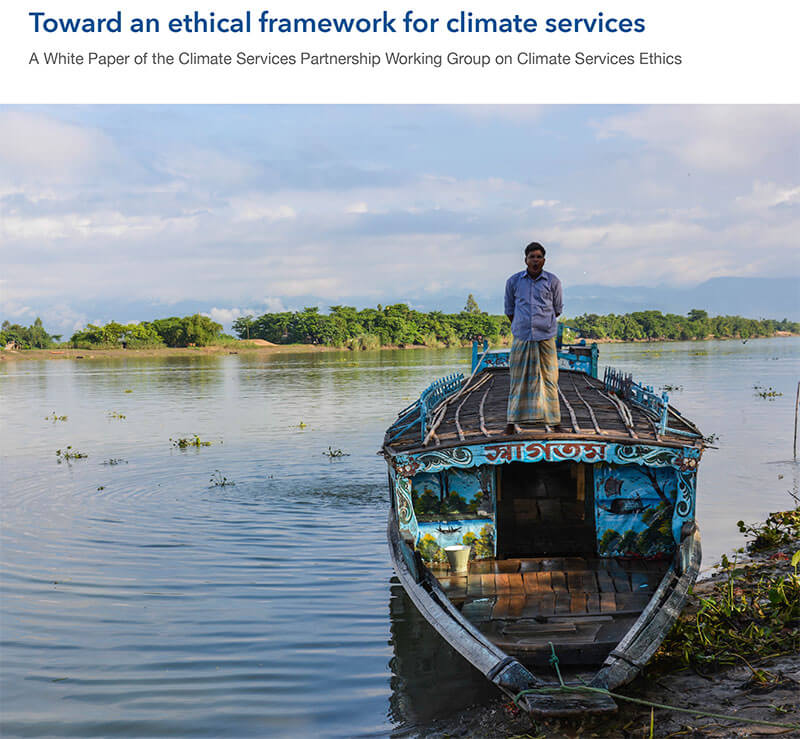Preámbulo del documento publicado por el Climate Services Partnership Working Group on Climate Services Ethics:
The impacts of climate variability and change are immediate, intensifying, and potentially dangerous. Climate services offer valuable information and tools that allow users to anticipate or address these impacts. However, climate services lack a cohesive ethical framework to govern their development and application. This paper is an early step in an open-ended process to establish a set of ethical principles to ensure that climate services are effectively deployed to manage climate risks, realize opportunities, and advance human security.
The need for a climate service ethic is significant and growing. To date, a multiplicity of competing interests and motivations across individuals and institutions has led to poor cohesion within the climate services community. Growing awareness of climate impacts has raised interest and investments in climate services across sectors and around the world. This has also led to the entrance of new actors seeking to provide these services. User demand for climate services is also rising, as is demand for new types of services.
This urgency is heightened by recognition that negative consequences can arise when climate services should be used and are not, and/or from the deployment of such services in ways that bias (implicitly or explicitly) an outcome. Meanwhile, there has been growing pressure from funders to operationalize climate research. With a range of evolving practices, there is increasing scope for malpractice and maladaptation. Hence, there is a time imperative to articulate a set of ethical principles to guide this emerging field.
There is no agreed upon governance for developing or applying climate services. Major efforts are underway to provide structure to these endeavors, including the Global Framework on Climate Services (GFCS) which “guide[s] the development and application of science-based climate information and services in support of decision-making in climate sensitive sector.” GFCS is governed by eight principles, but these pertain to the organization’s policy rather than to the remit of climate services per se.
Other relevant codes exist (WMO, FAO, NOAA, FCFA), but these are typically focused on specific regions or sectors or international climate change negotiations rather than the mainstreaming of climate information services. Recognizing this vacuum in guidance, this paper is an early step in an iterative process to establish a set of ethical principles to aid the climate services community.
The principles and practices that constitute this ethical framework are born from a set of reference points laid out in Box 1. While these views do not necessarily reflect those held by all stakeholders in climate services; they are, however, based on diverse experiences encompassing both western and developing countries, fundamental and applied climate research, various sectors, gender, and professional practice (academia, private sector,
government).This paper is intended for a broad audience. We hope that climate service providers (whether they are academics, in the private sector, engaged with national meteorological or hydrological services, or representing other types of organizations) will test this prototype framework against their own experiences and products. Likewise, climate services users can judge the principles presented, evaluate products delivered to them, and hold producers to account. International agencies (e.g. GFCS, IPCC) can bring valuable perspectives and leadership to the conversation, as well as provide insight into the development and operationalization of an authoritative framework. All readers are invited to reflect on this content, share their own perspectives, and support an iterative process of testing and refinement. For reference, a glossary of terms is included in Box 2.
In the following sections, we briefly present the motivational factors that inform our approach; articulate an ethical framework for climate services; and use this framework to derive principles that can guide behavior with respect to climate service products and practice. We conclude with some goals for the future in terms of the ethical implementation of climate services.
Descargar el documento completo (PDF).
